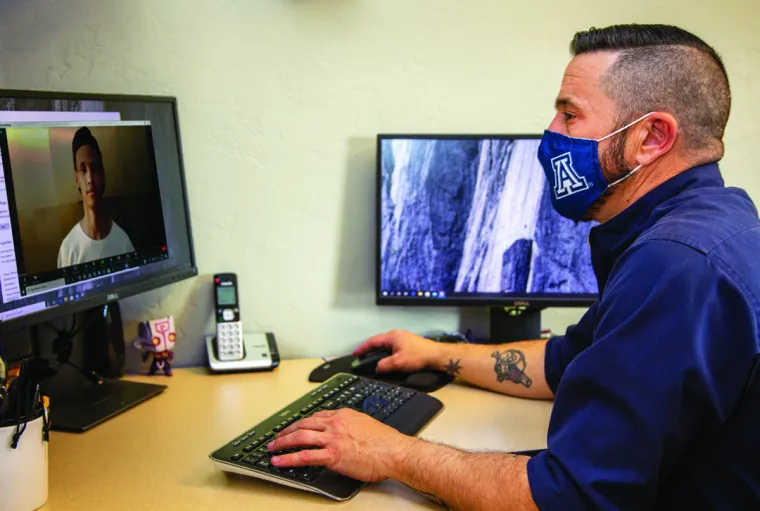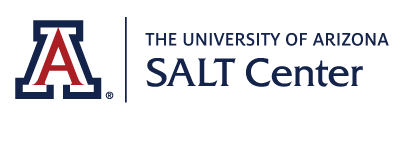Shifting Our Strategy to Meet the Challenges of 2020
Kimberly Valdez, Student Support Specialist
This past year has been a time of true self-reflection on who we are as people. As challenging as this time has been for the SALT Center staff and our students, we have remained connected and have continued to strengthen our relationships in the face of the global pandemic. The SALT Center has continued to thrive and provide thoughtful and personalized service to each of our incredibly resilient students. While our services have continued unimpeded in the virtual environment, there have been several strategic changes to programming, including a necessary shift in focus on the mental and emotional health of our students as well as on technology and virtual academic resources and support.
Caroline Ragano and Stephen Ferris have worked at the SALT Center in various capacities for many years. Caroline has been with the SALT Center for 26 years and began her career as an ASL tutor, then became an Instructional Specialist working with students on academic probation, and finally became a Student Support Specialist. Stephen Ferris has been with the SALT Center for 9 years and is now an Academic Intervention Coordinator. Both were interviewed and shared their experiences over the last year.
The Switch to Virtual Services
Regarding the SALT Center’s transition from a completely in-person service model to a virtual one, Stephen said it best, “The first couple weeks were obviously pretty hectic, and a lot of work had to be done behind the scenes to make it work, but now that it is working, it works very well.” The Learning Support Services team continues to work tirelessly to improve the execution of our online services. They have created virtual waiting rooms for our Reading and Writing Lab and Math and Science Lab, as well as virtual one on one sessions with Student Support Specialists, Academic Intervention Coordinators, and tutors. Stephen shares, “There was an initial learning curve for all of us, but I was impressed at how much people were able to make everything function virtually overnight…it has made it possible for us to continue most of our operations unimpeded at a time when it simply isn’t practical to be in the office.”
Despite all this support and the myriad of success with the transition, the virtual service model presents its own unique challenges. Caroline aptly remarked that, “In some ways, not seeing students directly was the greatest challenge. It’s harder to read things like nuances of body language and facial expressions.” A lot of work completed by Support Specialists and Academic Intervention coordinators is intuitive, and while it’s not impossible to pick up on emotional distress or anxiety online, a limited view of students makes this more challenging.
When asked how the transition to a virtual environment progressed for Support Specialists, Caroline felt, “For Specialists, it was an easy transition because we’re talking. It’s still the connection with people.” Overall, Specialist appointments have not changed all that much. Stephen shared, “If somebody had told me that we’d be doing this a year ago back in November 2019, I would have thought it would have taken us weeks to make this work and, in fact, it happened very quickly and works very efficiently. Ultimately, things have changed a lot, but at the same time have not really changed all that much. We are still delivering the same services we have for years, it’s just in a slightly different format.” Despite the challenges posed by the switch to a virtual environment, the transition has also introduced the SALT Center to new opportunities. These include increased access to even more potential students across the United States through virtual means as well as a burgeoning partnership with Arizona Online.
Our partnership with Arizona Online allows us to continue to serve an increasingly diverse population of students with learning and attention challenges nationwide. The pilot program began in Fall 2020 with five students, who were impressed with the solid framework of the program and the quality support services provided. We expect to have nine students in the program in Spring 2021. We are also extending services to distance learners as well, encompassing an even larger group of students who are taking University of Arizona classes on other college campuses around the country. The anticipated growth in this area of our services is an exciting next step for the SALT Center.
With the switch to a virtual environment, the SALT Center has been pushed into a new era and our staff has had to be adaptable and efficient in the acquisition of new skills. On this subject, Stephen commented, “I would hate to see all the resources, skills, strategies, and approaches we have developed over the past year go away because I think in the future more people are going to be looking towards the online environment as a way to go to school.” Moving forward, there is an interest in providing staff with even more opportunities to increase knowledge of online and virtual learning tools, not just so they are able to share more resources with students, but also for their own use and increased productivity.
Caroline shared another challenge SALT Center staff have witnessed firsthand with the switch to a virtual environment, that of, “watching students miss out on the typical college experience, as well as rites of passage like a typical graduation ceremony.” While students are receiving the same services from us that they would in person, they are missing out on other typical facets of the college experience, from basketball and football games, to piano recitals in the Fred Fox School of Music, or fraternity and sorority rush. The emotional impacts of missing out so broadly have come with a much-needed focus on mental and emotional health.
Strengthening Mental Health
Mental health has taken a front seat this past year with the increased stress of a drastically different learning and working environment as well as the inevitable social isolation the pandemic has caused.
Stephen, who is also part of the Wellness Team, a group that helps ensure both students and staff have access to and are fully aware of resources to help them cope, summarized that “We worked a lot on getting out the right message, making sure the students were familiar with various kinds of selfhelp techniques, and various kinds of methods for helping them manage stress and dealing with the various challenges of the pandemic.”
For the past four years, Caroline has worked with the Mindfulness Matters group, which offers students other tools to cope with stress. The group is focused on teaching simple techniques to help reduce anxiety and helps students build healthy habits that can positively influence their mental and emotional health. Student participation at these events has drastically increased. As the isolation caused by COVID-19 continues, the sense of community this group engenders is perhaps more important now than ever.

Forming Meaningful Connections
In this current environment, forming and maintaining meaningful connections with students has been extremely important. As Caroline shared, “This was a concern in the beginning. First, how will I form a meaningful connection with a student I have never met before in person? Second, how will I maintain a meaningful connection with my returning students?”. While connecting looks different today, connection itself has remained just as meaningful, and through all our efforts in our continued work with students we have been able, “to connect in a disconnected world,” as Caroline put it so eloquently. Technology is what has ultimately allowed us to maintain our relationships with each other, no matter the distance, and through these relationships, and in the context of COVID-19, we have all learned the value of human connection.
While the relationships students form with support staff are extremely important, the relationships students form with each other are also a vitally important aspect of the SALT Center experience. To that end, our Student Engagement Team has worked tirelessly to create virtual activities during the fall and spring semesters. Caroline explains, “Although we cannot have a group of people that hang out at SALT physically, we can create a sense of community and show students there is still a place where they belong.” The work of the Student Engagement Team is just another way we continue to provide opportunities for our students to connect with one another, and with staff.
Looking Forward
Our students and staff have seen many changes throughout our 40 years at the University of Arizona, especially this past year. No matter what lies ahead, our resilience and dedication will always be at the heart of a bright future. We know that with hope and hard work, we will continue to see positive transformations that will carry us forward into the next 40 years.

